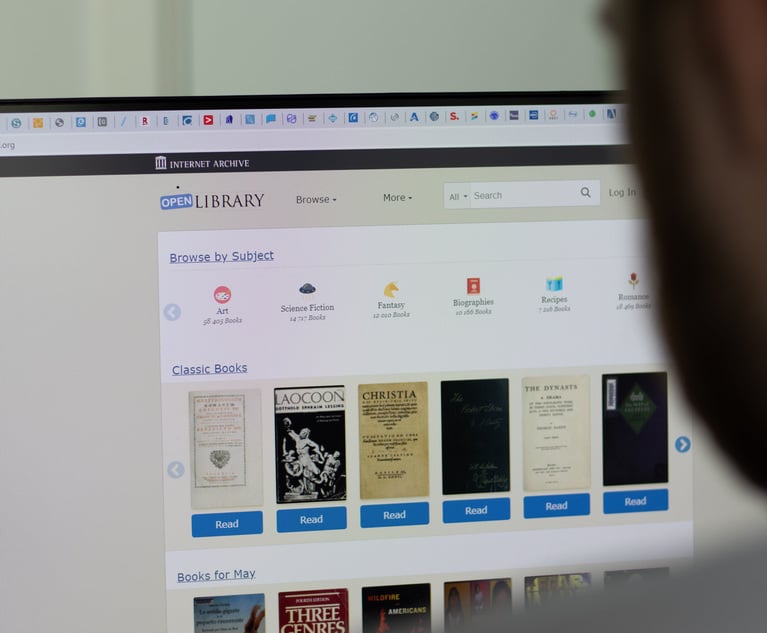5 Takeaways From IPForward's 2018 Conference
Here's some of the knowledge that a high-profile group of in-house IP specialists shared at the San Mateo conference on Wednesday.
April 12, 2018 at 03:04 PM
4 minute read
 Handout photo.
Handout photo. In-house intellectual property leaders from companies including Facebook Inc., Intel Corp. and Tesla Inc. got together to talk through some of the most challenging aspects of their field at management software IPfolio's 2018 IPForward Conference on Wednesday in San Mateo.
The daylong conference featured presentations from industry veterans about working with engineers, implementing artificial intelligence and prepping for an M&A deal.
Here are five of the conference's key takeaways:
1. To incentivize innovation, give public, lasting recognition.
Cash bonuses aren't spurring engineers to create new patents—at least according to Pure Storage associate general counsel, products and patents, Michael Moore. He says his Mountain View-based company created a new, more successful strategy. Inventors are rewarded with hip new sneakers, video game consoles or sweatshirts that proclaim their innovative thinking to their colleagues.
“Cash is great, but if you really want people to see it as a challenge, offer them something that makes it very visible,” Moore said.
2. Plan out an IP strategy that meets the company's needs and remind engineers and collaborators of it often.
John Schiffhauer, who until recently was vice president of IP at Intel, says it's important to sit down with colleagues and executives to identify why they are interested in pursuing more patents—are patent goals offensive moves, strategic money-makers or part of defending the company's innovations? Based on the answer, in-house IP lawyers can plan the best way to manage the company's portfolio.
Once a strategy is put together it's important to communicate the goals with all members of the design process, and emphasize it frequently. Schiffhauer says it's not a bad idea to post small written reminders of the company's end IP mission.
“[Everyone] should already know what the strategy is and what it means for their business,” he said. “Then you can go back and remind them of the strategy and defend it. Make something that memorializes your strategy so people can make a decision based on patent strategy.”
3. Open-source projects and patents don't have to conflict.
Moore also noted that some engineers may not see the value in patents, holding a belief that code and projects should be open-sourced. Those two things don't necessarily have to conflict, he says—each have their best use cases, and it's good to sit down and figure out what those are.
“When you're dealing with people who are pro-open source, you have to spend time and teach them what is the value of patented innovation as well as open source,” Moore said. “They're both great and two sides of one coin.”
4. Form relationships with developers, even when they're not working on a patent project.
Innovation won't come without investment—and not just of the monetary kind, speakers noted. Facebook's associate general counsel for patents, Gilbert Wong, said he spent his first year at the social media company forming relationships with developers.
While these relationships initially didn't lead to more innovation or production, Wong noticed that within a year, developers were approaching him and filling him in on new ideas and projects. He was in the loop and trusted. When he met with lead developers, he didn't have to be brought up to speed, which allowed them to collaborate and strategize on new patent applications.
“Now, [developers] are proactive, coming to me to disclose what they're working on,” Wong said. “They see us as partners.”
5. Before entering an M&A deal, know where the company's patents are held, their value and who has ownership.
Joan McGillycuddy, chief IP counsel for New York-based New Avon was in-house at beauty product retailer Avon when the company spun out its North American business into New Avon—a move that forced her and her team to re-examine their patent ownership and patent value.
She said that having an organized and already-valued portfolio would have made the separation and subsequent deal with Cerberus Capital Management easier and faster. It's important that this valuation be done from someone outside the company, she noted, to make it credible.
“The more you organize your portfolio, the more you can help drive a deal and not be brought in at the last minute,” she said. ”If you get data, store it somewhere you can access it readily, because if there is a deal, having that helps you argue for what your company is worth.”
This content has been archived. It is available through our partners, LexisNexis® and Bloomberg Law.
To view this content, please continue to their sites.
Not a Lexis Subscriber?
Subscribe Now
Not a Bloomberg Law Subscriber?
Subscribe Now
NOT FOR REPRINT
© 2025 ALM Global, LLC, All Rights Reserved. Request academic re-use from www.copyright.com. All other uses, submit a request to [email protected]. For more information visit Asset & Logo Licensing.
You Might Like
View All


FTC Decries Social Media Platforms' 'Vast Surveillance' of Users
Trending Stories
- 1Court Rejects San Francisco's Challenge to Robotaxi Licenses
- 2'Be Prepared and Practice': Paul Hastings' Michelle Reed Breaks Down Firm's First SEC Cybersecurity Incident Disclosure Report
- 3Lina Khan Gives Up the Gavel After Contentious 4 Years as FTC Chair
- 4Allstate Is Using Cell Phone Data to Raise Prices, Attorney General Claims
- 5Epiq Announces AI Discovery Assistant, Initially Developed by Laer AI, With Help From Sullivan & Cromwell
Who Got The Work
J. Brugh Lower of Gibbons has entered an appearance for industrial equipment supplier Devco Corporation in a pending trademark infringement lawsuit. The suit, accusing the defendant of selling knock-off Graco products, was filed Dec. 18 in New Jersey District Court by Rivkin Radler on behalf of Graco Inc. and Graco Minnesota. The case, assigned to U.S. District Judge Zahid N. Quraishi, is 3:24-cv-11294, Graco Inc. et al v. Devco Corporation.
Who Got The Work
Rebecca Maller-Stein and Kent A. Yalowitz of Arnold & Porter Kaye Scholer have entered their appearances for Hanaco Venture Capital and its executives, Lior Prosor and David Frankel, in a pending securities lawsuit. The action, filed on Dec. 24 in New York Southern District Court by Zell, Aron & Co. on behalf of Goldeneye Advisors, accuses the defendants of negligently and fraudulently managing the plaintiff's $1 million investment. The case, assigned to U.S. District Judge Vernon S. Broderick, is 1:24-cv-09918, Goldeneye Advisors, LLC v. Hanaco Venture Capital, Ltd. et al.
Who Got The Work
Attorneys from A&O Shearman has stepped in as defense counsel for Toronto-Dominion Bank and other defendants in a pending securities class action. The suit, filed Dec. 11 in New York Southern District Court by Bleichmar Fonti & Auld, accuses the defendants of concealing the bank's 'pervasive' deficiencies in regards to its compliance with the Bank Secrecy Act and the quality of its anti-money laundering controls. The case, assigned to U.S. District Judge Arun Subramanian, is 1:24-cv-09445, Gonzalez v. The Toronto-Dominion Bank et al.
Who Got The Work
Crown Castle International, a Pennsylvania company providing shared communications infrastructure, has turned to Luke D. Wolf of Gordon Rees Scully Mansukhani to fend off a pending breach-of-contract lawsuit. The court action, filed Nov. 25 in Michigan Eastern District Court by Hooper Hathaway PC on behalf of The Town Residences LLC, accuses Crown Castle of failing to transfer approximately $30,000 in utility payments from T-Mobile in breach of a roof-top lease and assignment agreement. The case, assigned to U.S. District Judge Susan K. Declercq, is 2:24-cv-13131, The Town Residences LLC v. T-Mobile US, Inc. et al.
Who Got The Work
Wilfred P. Coronato and Daniel M. Schwartz of McCarter & English have stepped in as defense counsel to Electrolux Home Products Inc. in a pending product liability lawsuit. The court action, filed Nov. 26 in New York Eastern District Court by Poulos Lopiccolo PC and Nagel Rice LLP on behalf of David Stern, alleges that the defendant's refrigerators’ drawers and shelving repeatedly break and fall apart within months after purchase. The case, assigned to U.S. District Judge Joan M. Azrack, is 2:24-cv-08204, Stern v. Electrolux Home Products, Inc.
Featured Firms
Law Offices of Gary Martin Hays & Associates, P.C.
(470) 294-1674
Law Offices of Mark E. Salomone
(857) 444-6468
Smith & Hassler
(713) 739-1250







